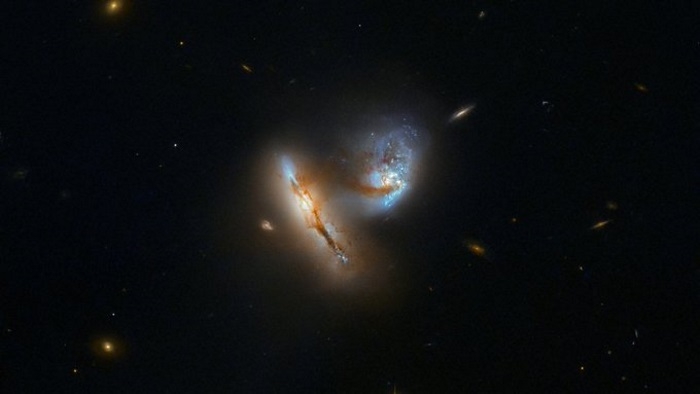Spectacular! NASA’s Hubble catches play of galaxy couple
Total Views |
Washington, Aug. 16: Space is full of surprises and wonderful things. International space agencies are always observing these magnificent phenomenons. Giving another surprise from space, the NASA-operated Hubble telescope has documented a pair of galaxies, collectively known as UGC 2369, charging towards one another.

Astronomers think the two galaxies are slowly merging with each other due to their close proximity. The stunning image shows both the galaxies appearing distorted as the merger unfolds.
Under a strong gravitational pull and with no hope or scope of escape, the twists and contortions of the Northern Galaxy 2369 (UGC 2369N) and the Southern Galaxy UGC 2369 (UGC 2369S) are visible in the Hubble image. In the space between the galaxies is a massive amount of stellar gas and cosmic dust, both of which are abundant in regions of celestial formation and destruction.
On this spectacular view, NASA said, “A tenuous bridge of gas, dust, and stars can be seen connecting the two galaxies, created when they pulled out into space across the diminishing divide between them”.
. These interactions among galaxies are a very common event, For fairly large galaxies like the Milky Way, most such incidents involve encounters between dwarf galaxies.
"Interaction with others is a common event in the history of most galaxies. For larger galaxies like the Milky Way, the majority of these interactions involve significantly smaller so-called dwarf galaxies. But every few billion years, a more momentous event can occur," NASA said in a statement.
A popular theory claims that the Milky Way will collide with its nearest galactic neighbor Andromeda in the distant future. Andromeda is considerably larger than the Milky Way. This is the next big event for our home galaxy, expected to take place four billion years from now. Researchers think the two galaxies will merge into one over time, forming a new galaxy which has already been nicknamed "Milkomeda."